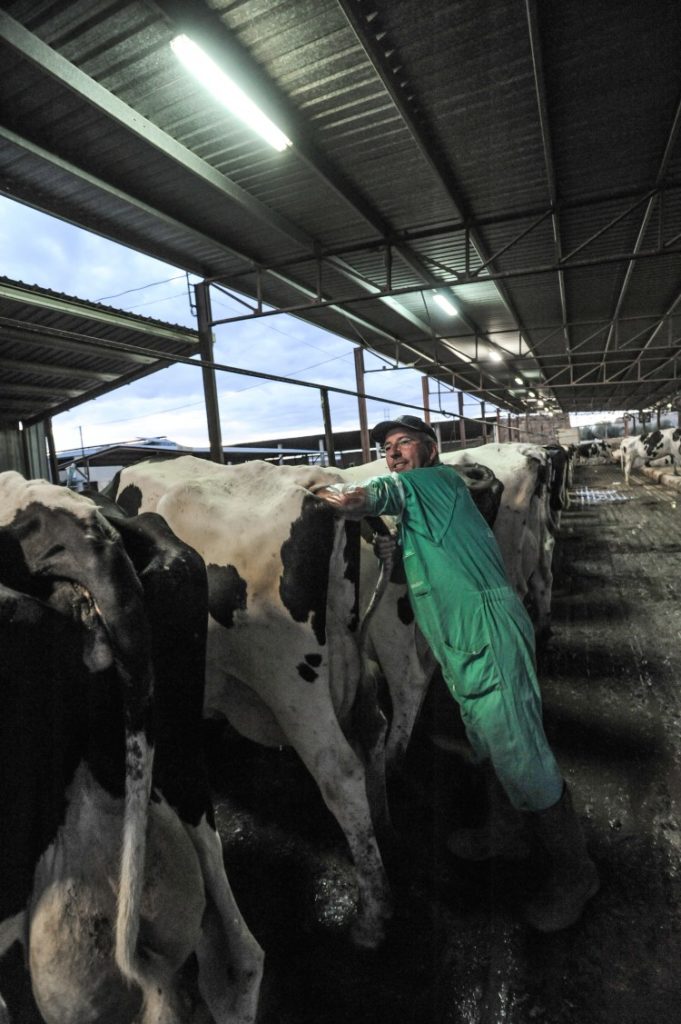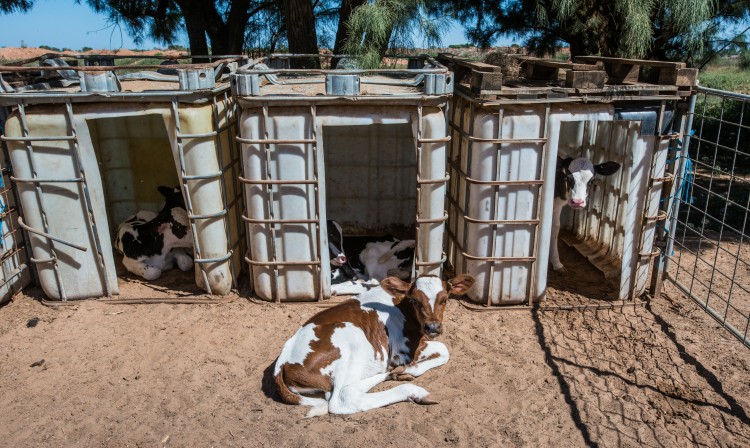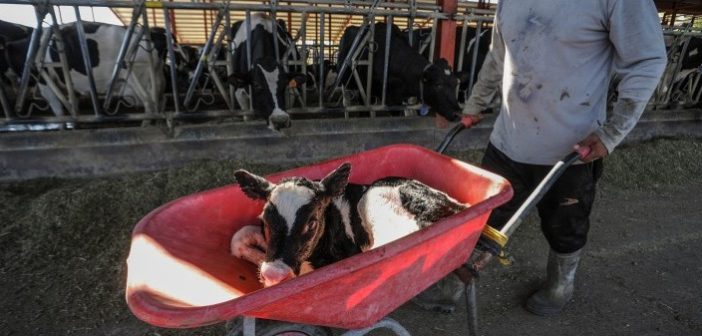Written by Justine Butler
We’re upset by stories of violence against women – rape, forced pregnancy, infants being snatched away from their mothers. Yet these are all routine practices in the modern dairy farm. Women have fought hard for the right to control what happens to our bodies; female cows have no such choice. Is milk a feminist issue? I believe so.
Key to feminist politics is a woman’s right to control her own reproductive system. It’s well-documented how sexual violence is used as a means of control, and is linked to patriarchy, capitalism and other forms of oppression. It wasn’t until 1991 that rape within marriage became a crime in the UK. Before this, the law implied that women were the property of their husbands.
Sexual violence
Acts of sexual violence against animals disgust most people. So why ignore the abuse of dairy cows? Milk is the product of the exploitation of the reproductive capacity of a female body. American writer, activist and animal rights advocate, Carol J. Adams, says: “I would like to see reproductive freedom for all female animals, not just human females.”
History of feminism
The history of feminism is often divided into four waves, suffragettes being first and campaigning for women’s right to vote, among other things. Women’s liberation in the 1960s, campaigning for legal and social equality, was second. “Ecofeminism” emerged in the 1980s, combining feminism with ecology. Vegetarian ecofeminism identified with the oppression of farmed animals. But in the 1990s, ecofeminism fell out of favor. Critics said linking women to some mystified notion of nature was regressive, and the links between animal abuse and women’s oppression were dismissed as postmodern feminism focused on humans, with little actual concern for animals or the environment.
Me too
The fourth wave began around 2013, with social media being used to build strong, reactive movements such as #metoo, highlighting the prevalence of sexual assault and harassment of women, especially in the workplace. When animal rights campaigners used the hashtag on behalf of voiceless animals it caused consternation and even outrage that the suffering of animals was considered comparable to that of women.
Speciesism

But can there be a divide between social justice, feminist and animal rights movements? The reproductive freedom of women and animals are both intrinsically linked to patriarchy, capitalism and other forms of oppression. So why pick and choose which form of oppression you oppose? This type of separate thinking is called speciesism – the assignment of different moral values or rights to individuals on the basis of what species they belong to. American writer, activist and animal rights advocate, Carol Adams, says “I am a vegan-feminist because I am one animal among many, and I don’t wish to impose a hierarchy of consumption upon this relationship.”
Some say speciesism is a prejudice similar to racism, and analogies have been made between livestock farming and slavery. In her book The Dreaded Comparison: Animal Slavery and Human Slavery, Marjorie Spiegel says: “Both humans and animals share the ability to suffer from restricted freedom of movement, from the loss of social freedom and to experience pain at the loss of a loved one. Both groups suffer or suffered from their common capacity to be terrified, by being hunted, tormented or injured. Both have been objectified, treated as property rather than as feeling, self-directed individuals…”
Writer and activist Alice Walker says: “The animals of the world exist for their own reasons. They were not made for humans any more than black people were made for whites or women for men.”
Pathetic logic
The assumption that animals don’t suffer when kept in conditions that would be considered intolerable for humans is largely based on the idea that they are less intelligent. John Webster, Emeritus Professor in Animal Husbandry at Bristol University, says: “People have assumed that intelligence is linked to the ability to suffer and that because animals have smaller brains they suffer less than humans. That is a pathetic piece of logic.”
Research shows that cows nurture friendships, bear grudges and can feel strong emotions such as pain, fear, anxiety and great joy. I recently saw ten rescued calves arrive at the Dean Farm Trust animal sanctuary near Chepstow, Wales. Though cautious at first, they emerged from the trailer into a beautiful, spacious hay-filled barn and literally jumped for joy!
Milk myths
The bucolic image of milk coming from a cow with her calf in a pastoral setting is a myth. Just like us, cows only produce milk after a nine-month pregnancy and birth. A modern dairy cow is confined and forcibly impregnated shortly after her first birthday, using a restraining apparatus called a “rape rack.” She would naturally suckle her calf for nine months but in dairy farms, calves are removed within a day or two so that humans can take her milk. Male calves are unwanted “by-products,” and every year in the UK around 95,000 are shot, while others are sold for veal production.

Grieving mothers
Mother cows feel distress when their offspring are taken. They cry and bellow. They are still grieving as the milking machines suck the milk from their udders.
The modern dairy cow has been selectively bred to produce over 20 liters of milk daily, much more than her calf needs. To keep up production, she is re-impregnated soon after giving birth. Modern dairy farming employs a highly regulated regime of pregnancy and lactation, meaning that most cows are pregnant while being milked for much of the year. Shackles are sometimes used on her hind legs if she has suffered muscle or nerve damage and cannot stand unaided.
Tremendous physical strain
This intensive physical demand puts a tremendous strain on her young body, and she is likely to suffer from infections such as mastitis and laminitis, cutting short her productive life. Physically ravaged from the abuse, she is killed to be eaten in cheap pies and pasties – and baby food! The average lifespan of a modern dairy cow is around five years, when she could naturally live for 20 to 30 years.
Is milk a feminist issue? Of course it is; the sexual and reproductive choices feminists fight for, cows are denied. A torturous cycle of physical and emotional torment is enforced upon them until they break. Milk comes from a grieving mother.
Featured image: a young calf is removed from their mother shortly after birth and brought to a crate. This is the reality of dairy farming. Image credit Jo-Anne McArthur / Animal Equality.





